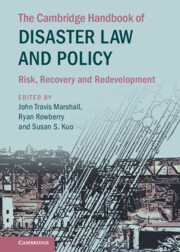Book contents
- The Cambridge Handbook of Disaster Law and Policy
- The Cambridge Handbook of Disaster Law and Policy
- Copyright page
- Dedication
- Contents
- Figures
- Maps
- Tables
- Contributors
- Foreword: Current Trends in Disaster Law and Policy
- Acknowledgments
- Introduction
- Part I Critical Perspectives on the Evolution of Disaster Law and Policy
- Part II Effective Governance as an Imperative for Responsive Disaster Law and Policy
- Part III Law’s Role in Promoting Hazard Mitigation: Intergovernmental, International, National, and Local Approaches
- 9 Local Resilience, Land Use Law, and Disaster Planning
- 10 Financing City Resilience
- 11 Disaster, Land Use, European Union Law and the Impact on EU Member States: The Relevance of the 2019 Decision of the Dutch Supreme Court Ordering Cuts in Greenhouse Gas Emissions
- 12 Covid-19 and Cooperation in Times of Disaster
- 13 Disaster Recovery in Rural Communities
- 14 Wildfire Federalism: A Framework for Local Government Participation in Disaster Planning
- 15 A Comparative Review of Hazard-Prone Housing Acquisition Laws, Policies, and Programs in the United States and Aotearoa New Zealand: Opportunities to Improve Practice
- 16 Urban Transformation as a Resilience Strategy: Earthquake Preparedness in Istanbul
- 17 How Do Green Cities Prevent Disasters?
- 18 Constructing a Resilient Energy Supply
- 19 Building a Resilient Power Grid
- 20 Weaponizing Private Property and the Chilling Effect of Regulatory Takings Jurisprudence in Combating Global Warming
- Part IV Private Sector Initiatives to Promote Disaster Resilience and Recovery
- Part V Lawyers As Disaster Law and Policy Leaders: Training for Students and Guidance for Practitioners
- Part VI Cultural Heritage Protection and Cross-Disciplinary Opportunities for Advancing Disaster Law and Policy
- Part VII Disasters and Vulnerable Communities
11 - Disaster, Land Use, European Union Law and the Impact on EU Member States: The Relevance of the 2019 Decision of the Dutch Supreme Court Ordering Cuts in Greenhouse Gas Emissions
from Part III - Law’s Role in Promoting Hazard Mitigation: Intergovernmental, International, National, and Local Approaches
Published online by Cambridge University Press: 27 October 2022
- The Cambridge Handbook of Disaster Law and Policy
- The Cambridge Handbook of Disaster Law and Policy
- Copyright page
- Dedication
- Contents
- Figures
- Maps
- Tables
- Contributors
- Foreword: Current Trends in Disaster Law and Policy
- Acknowledgments
- Introduction
- Part I Critical Perspectives on the Evolution of Disaster Law and Policy
- Part II Effective Governance as an Imperative for Responsive Disaster Law and Policy
- Part III Law’s Role in Promoting Hazard Mitigation: Intergovernmental, International, National, and Local Approaches
- 9 Local Resilience, Land Use Law, and Disaster Planning
- 10 Financing City Resilience
- 11 Disaster, Land Use, European Union Law and the Impact on EU Member States: The Relevance of the 2019 Decision of the Dutch Supreme Court Ordering Cuts in Greenhouse Gas Emissions
- 12 Covid-19 and Cooperation in Times of Disaster
- 13 Disaster Recovery in Rural Communities
- 14 Wildfire Federalism: A Framework for Local Government Participation in Disaster Planning
- 15 A Comparative Review of Hazard-Prone Housing Acquisition Laws, Policies, and Programs in the United States and Aotearoa New Zealand: Opportunities to Improve Practice
- 16 Urban Transformation as a Resilience Strategy: Earthquake Preparedness in Istanbul
- 17 How Do Green Cities Prevent Disasters?
- 18 Constructing a Resilient Energy Supply
- 19 Building a Resilient Power Grid
- 20 Weaponizing Private Property and the Chilling Effect of Regulatory Takings Jurisprudence in Combating Global Warming
- Part IV Private Sector Initiatives to Promote Disaster Resilience and Recovery
- Part V Lawyers As Disaster Law and Policy Leaders: Training for Students and Guidance for Practitioners
- Part VI Cultural Heritage Protection and Cross-Disciplinary Opportunities for Advancing Disaster Law and Policy
- Part VII Disasters and Vulnerable Communities
Summary
This chapter studies the role of the EU and EU Member States in relation to disasters and land-use planning. The work analyzes how land-use planning can evaluate and manage risks to avoid disasters, paying special attention to European use of the precautionary principle. The analysis uses especially, but not only, the example of the Spanish legal system, taking into account its inclusion in the more general EU legal system. The study also considers private and public liability in relation to disasters, underlining how, in recent years, EU law and European caselaw have created a common framework based on the right to good administration. The study includes a reference to the famous case decided by the Dutch Supreme Court at the end of 2019 ordering the Government to reduce greenhouse gas emissions in accordance with the duty of due diligence or due care. Finally, this chapter explores possible consequences of maladministration when taking planning decisions in relation to possible public liability, using two real Spanish cases as specific examples.
Keywords
- Type
- Chapter
- Information
- The Cambridge Handbook of Disaster Law and PolicyRisk, Recovery, and Redevelopment, pp. 207 - 220Publisher: Cambridge University PressPrint publication year: 2022

